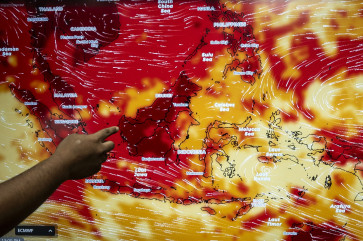Tobacco lobby retains tight grip on Indonesia: Study
The Indonesian tobacco lobby is still the most powerful in Southeast Asia, a recent study has concluded, reflecting the difficulty faced by campaigners against the damage smoking does to health in the world’s second-largest cigarette market
Change Size

The Indonesian tobacco lobby is still the most powerful in Southeast Asia, a recent study has concluded, reflecting the difficulty faced by campaigners against the damage smoking does to health in the world’s second-largest cigarette market.
Carried out by the Southeast Asia Tobacco Control Alliance (SEATCA) with help from antitobacco groups in the nine assessed Southeast Asian countries, the study found that Indonesia had a tobacco-interference index of 81 in 2017, followed by Vietnam, Myanmar, Laos, Malaysia, Cambodia, Thailand, the Philippines and Brunei Darussalam.
Widyastuti Soerojo, head of the Indonesian Public Health Association’s (IAKMI) tobacco control board, said Indonesia’s index showed how “powerless” the country had been in tackling the influence of the tobacco industry, which “can potentially interfere in policy-making.”
“This weakness is because the government has not been solid in its stance on the tobacco issue. While the Health Ministry is strong in issuing antitobacco policies, the others are not,” Widyastuti told a media briefing in Jakarta on Monday held to discuss the SEATCA report.
The index used seven indicators to gauge the state of tobacco interference in the assessed countries, namely tobacco participation in policy development, tobacco industry-related corporate social responsibility (CSR) activities, benefits to the tobacco industry, unnecessary interaction, transparency, conflicts of interest and preventive measures.
SEATCA was supported by three Jakarta-based organizations, the IAKMI, the World Health Organization (WHO) and the Jakarta Residents Forum (FAKTA) in measuring tobacco interference in Indonesia by monitoring daily publications in newspaper and online outlets, government-agency websites, cigarette-producer websites, tobacco proponent groups’ websites and documentation of tobacco-related activities.
From the full-year monitoring, the assessors gathered numerous indicators of tobacco interference, some of which were very apparent such as the presence of government officials in tobacco-related events, the participation of cigarette makers in shaping tobacco-excise policies and the dubious deliberation of the tobacco bill in the House of Representatives.
Under tobacco participation in policy development, the groups found news items about cooperation between policy makers and the cigarette industry, one of which was about the East Java Provincial Legislative Council accepting the idea of making a tobacco bylaw proposed by a union of local cigarette producers.
Other publications used in the monitoring also included how the Finance Ministry’s directorate-general for customs and excises refused to simplify the tobacco excise tiers, apparently to accommodate requests by the tobacco industry. This was used to gauge the benefits to the tobacco industry indicator.
“The law doesn’t require the government to consider health issues in shaping excises policies, while at the same time it has to accommodate the industry’s aspirations,” said Abdillah Ahsan, a researcher with the University of Indonesia’s (UI) Demographic Institute.
Tobacco policy-making was also not transparent in 2017, the report found, based on the controversial deliberation process of the tobacco bill, which seeks to increase cigarette production, aims to protect tobacco as a “national heritage,” but stipulates lenient obligations in relation to health protection.
Frequent engagement of government officials in tobacco firms’ CSR programs also signified the government’s somewhat friendly relationship with the tobacco industry. One of these was Surakarta, Central Java, Mayor FX Hadi “Rudy” Rudyatmo, who on June 2016 publicly praised the flood-disaster aid provided by PT Hanjaya Mandala Sampoerna, the foremost asset of Philip Morris International in Indonesia.
There has been slight progress, however, in the effort to tackle the tobacco lobby in Indonesia, with the 2017 figure having slightly decreased from the index in the previous year of 84, due in part to the issuance of a Health Ministry regulation on tackling tobacco interference in 2016.
It remains to be seen whether the rule is well implemented to cope with the tobacco lobby in Indonesia, as challenges such as foreign tobacco investment in Indonesia continue to linger, experts attending Monday’s event said.
“Indonesia still sees foreign investment in the tobacco industry, and the loose regulation is a sign of a conducive business climate,” said Widyastuti.
The most recent was the US$677 million deal in which Japan Tobacco agreed to buy PT Surya Mustika Nusantara from local cigarette giant Gudang Garam, along with Surya’s distributor PT Karyadibya Mahardhika.
“In Indonesia, tobacco is regarded as a normal business. If the government still holds this view, the index will remain high in the future,” said FAKTA member and public lawyer Tubagus Haryo Karbyanto.
Almost two in three Indonesian males smoke, most of whom start the habit at 15 to 19 years old, WHO has found.









